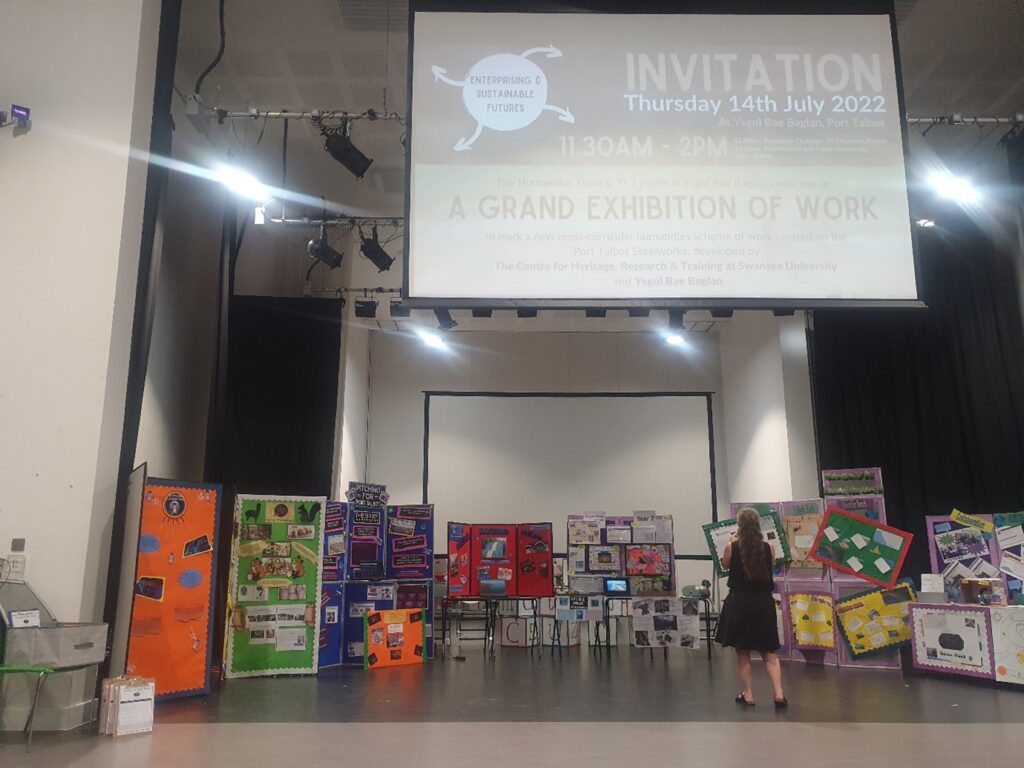Rebecca Bangera
In my case, the SPIN Internship program allowed me to work with CHART and the Humanities and Social Health Science Year 7 teachers at Ysgol Bae Baglan Comprehensive School in Port Talbot on a project called ‘The Enterprising and Sustainable Futures’, funded through the Research Wales Innovation Fund.[1] The main objective of the project was to support the teachers and the schools in transitioning to the New Curriculum for Wales through the design of a cross-disciplinary teaching resource pack. The new curriculum, which becomes statutory for secondary schools in September 2023,[2] presents an exciting opportunity to engage learners in new ways and to encourage valuable skills and mind-sets that will stay with young people throughout their lives.
The teachers at Ysgol Bae Baglan were an enthusiast bunch who were working on the planning and implementation of a project that focused on the heritage and sustainability of the steel industry in Port Talbot, in collaboration with Tata Steel. My role entailed observing lessons, participating in organising an end-of-project exhibition, and supporting project feedback and evaluation. The teachers’ approach was to integrate history, geography, and religious education subjects with business and enterprise. By interacting with Tata Steel staff, students experienced first-hand how climate change is impacted by carbon emissions from the steelworks and how Tata Steel are striving to reduce pollution levels and develop steel sustainability in the future. These endeavours helped the students gain a positive insight into their local industry, its heritage, and its potential future. [3]
The project brought out the students’ creativity, out-of-the-box thinking, and enabled exploration beyond the school’s boundaries. The history team took the students on a Time Travel into Port Talbot’s Tata steelworks. This involved looking at Port Talbot’s history through archive materials, interviewing older relatives and recording their memories, collecting photographs, and letters of that area, and bringing in local historians to speak to the classes. The geography team worked on how to improve the conditions of beaches, parks and canals and the religious education team worked with students on how to make sustainable lifestyle choices. The film created by Year 9 students considered new research on the conversion of CO2 emissions into algae.
The project culminated in July 2022 with a grand exhibition that showcased the work of the students in the form of film and displays. The most intriguing aspect of the exhibition was a competitive event between various groups of students who pitched creative business ideas for starting a sustainable business enterprise. The exhibition was attended by the school community as well as academics from Swansea University and Tata staff.
As a part of the feedback and evaluation team of the project, I conducted interviews with the teachers who took part, which was an engaging and enlightening experience. The teachers expressed their support for incorporating project work into the New Curriculum for Wales because this type of learning helps children evolve and become more aware of their local area, which in turn enables them to be better informed citizens.
I have a great deal of admiration for the teachers and creative minds behind the Ysgol Bae Baglan heritage and sustainability project, and I gained a lot of knowledge in the short time I was involved. In a nutshell, this is futuristic learning, and the preservation of Port Talbot’s industrial heritage is highly desired. Likewise, the future of the community is dependent on the sustainable work done in the present. As a result, this project was undoubtedly a step toward achieving the desired goal. Congratulations to everyone who is working wholeheartedly to turn these expectations into a reality!
[1] https://chart.swansea.ac.uk/ ; https://www.swansea.ac.uk/business-and-industry/access-our-research-development/rwif/
[2] https://hwb.gov.wales/curriculum-for-wales
[3] https://www.tatasteeleurope.com/corporate/news/tata-steel-launches-low-co2-steel
